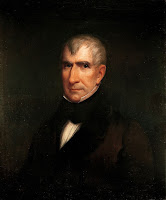Part of an ongoing, occasional series looking at the state of democracy and the political process in the United States in light of the 2024 presidential election.
A brief essay on the Whig Party in the United States. How and when did the Whig Party form? What was the Whig Party's core beliefs and policy agenda? Who were the Whig presidents, and what were their noteworthy accomplishments, if any, while in office? Was the Whig Party in the United States considered a third party?
The rise and fall of the Whig Party in the United States
The Whig Party, a significant political force in the United States during the 19th century, emerged as a response to the shifting dynamics of American politics. Formed in the early 1830s, the Whigs represented a diverse coalition of interests united by their opposition to the policies of President Andrew Jackson and his Democratic Party. Despite their relatively short existence, the Whigs played a crucial role in shaping American political discourse, advocating for economic modernization, infrastructure development, and a more active role for the federal government.
 | ||
| William Henry Harrison |
At its core, the Whig Party espoused several key beliefs and policy agendas. One of its primary objectives was promoting economic development through the implementation of protective tariffs, internal improvements such as roads and canals, and support for a national banking system. Whigs believed that these measures would stimulate economic growth and facilitate the expansion of commerce and industry. Additionally, the party advocated for a strong federal government capable of fostering national unity and promoting the common good, in contrast to Jacksonian Democrats' emphasis on states' rights and limited government intervention.
Throughout its existence, the Whig Party produced four presidents: William Henry Harrison (1841), John Tyler (1841-1845), Zachary Taylor (1849-1850), and Millard Fillmore (1850-1853). Of these four, only Harrison and Taylor were elected, while Tyler and Fillmore, their respective vice presidents, assumed the office upon their deaths.
William Henry Harrison, a general and war hero elected in 1840, served the shortest term of any U.S. president, succumbing to pneumonia just a month after his inauguration. Despite his brief tenure, Harrison's election marked a significant victory for the Whig Party, as he ran on a platform emphasizing economic policies favoring industrial development and infrastructure improvements.
 |
| Zachary Taylor |
Zachary Taylor, another celebrated general and war hero, assumed the presidency in 1849. Although Taylor's presidency was cut short by his death in 1850, his administration was marked by efforts to address the divisive issue of slavery in the newly acquired territories from Mexico. Taylor's proposed admission of California as a free state sparked intense debate and ultimately contributed to the Compromise of 1850, a temporary resolution to the ongoing sectional tensions between the North and South.
Millard Fillmore, who succeeded Taylor upon his death, continued the Whig Party's emphasis on economic development and infrastructure projects. Fillmore's presidency was overshadowed by the escalating tensions over slavery, particularly with the passage of the Fugitive Slave Act as part of the Compromise of 1850. Despite his efforts to maintain national unity, Fillmore's support for the compromise further alienated anti-slavery Whigs in the North and contributed to the party's decline.
The Whig Party's demise can be attributed to several factors, including internal divisions over slavery, the emergence of the anti-slavery Republican Party, and changing socio-economic dynamics in the United States. By the mid-1850s, the party had fragmented beyond repair, paving the way for the Republican Party's ascendance as the dominant political force opposed to the expansion of slavery.
In conclusion, the Whig Party's formation in the early 1830s marked a significant chapter in American political history. Despite its relatively short existence, the Whigs advocated for policies aimed at promoting economic development, infrastructure improvements, and a strong federal government. While the party produced several presidents, including William Henry Harrison, John Tyler, Zachary Taylor, and Millard Fillmore, internal divisions over slavery and changing political dynamics ultimately led to its demise by the mid-1850s. Nevertheless, the Whig Party's legacy continues to resonate in American politics, serving as a reminder of the complexities and tensions inherent in the country's democratic experiment.
The Whigs were not a third party, but a major party during its time
The Whig Party in the United States was not considered a third party in the traditional sense. Instead, it was one of the two major political parties during the mid-19th century, alongside the Democratic Party. As previously noted, the Whigs emerged as a significant political force in the early 1830s in response to the policies of President Andrew Jackson and his Democratic Party. They represented a diverse coalition of interests, including former National Republicans, Anti-Masons, and disaffected Democrats, united by their opposition to Jacksonian policies such as the dismantling of the national bank.
Throughout the 1830s and 1840s, the Whig Party competed directly with the Democratic Party in national elections, fielding candidates for the presidency, Congress, and state offices. The Whigs enjoyed varying degrees of success during this period, electing several presidents, including William Henry Harrison, Zachary Taylor, and Millard Fillmore.
While the Whig Party ultimately declined and disbanded in the 1850s due to internal divisions over issues such as slavery, it was not considered a third party during its existence. Instead, it was one of the dominant political parties of its time, representing a significant portion of the American electorate and competing on equal footing with the Democrats. The rise of the Republican Party in the 1850s, which absorbed many former Whigs and emerged as the primary opposition to the Democrats, marked the end of the Whig Party's prominence in American politics.
No comments:
Post a Comment